Research
Prof. Banadda Inaugurated as one of 10 O.R. Tambo Africa Research Chairs-Attracts USD250k & EUR100k Annually
Published
5 years agoon
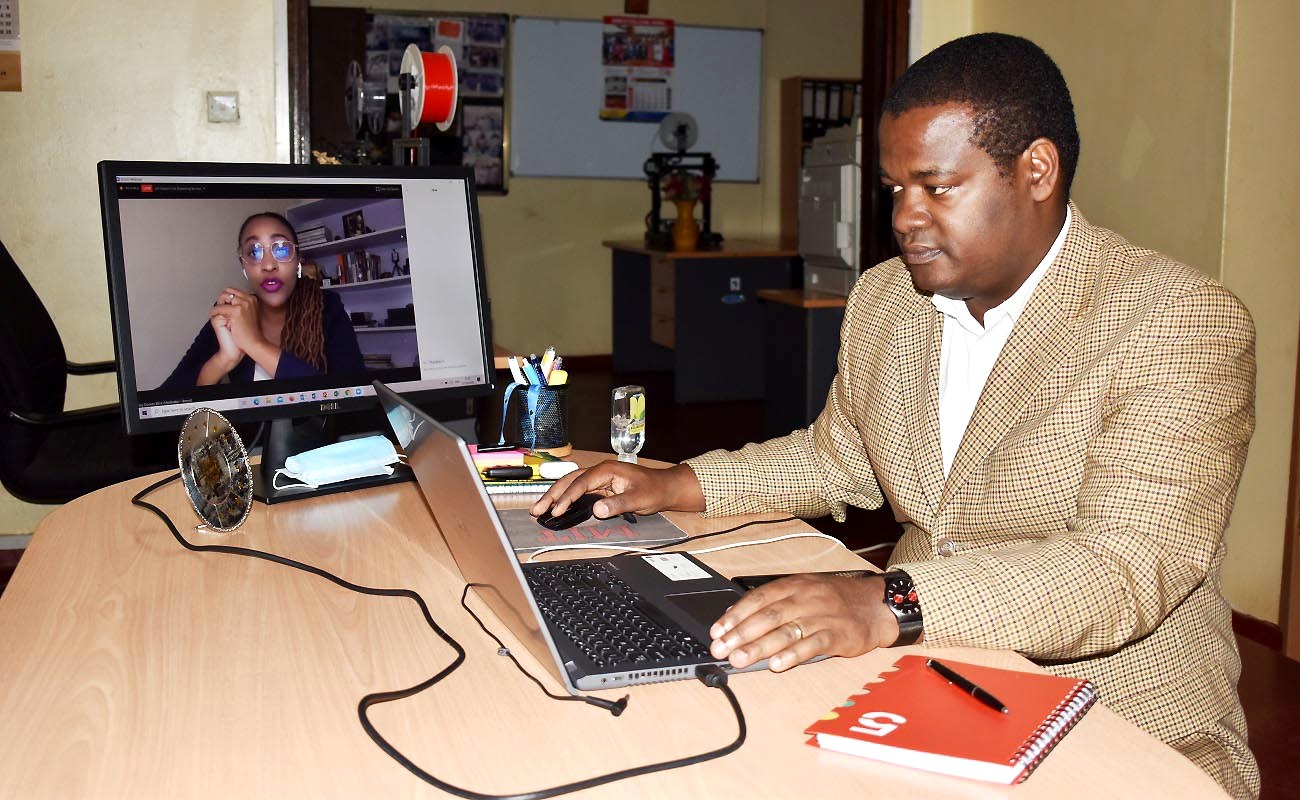
Makerere University’s Professor Noble Banadda was on 27th October 2020 inaugurated as one of the 10 Oliver Reginald Tambo Africa Research Chairs Initiative (ORTARChI) recipients. The inauguration ceremony was held via zoom from South Africa. In Uganda and Makerere University, the ceremony was witnessed by media at the African Institute for Capacity Development (AICAD) Project Office.
For the next five years, Prof. Banadda will receive US$250,000 annually and an additional offer of €100,000 from Wageningen University for the next 15 years. The grants will be utilized in supervising research in agricultural waste management on farms with a target of training 15 PhD, 9 Postdoctoral and 27 Masters students.
The ORTARChI chair and grant feeds into the Makerere’s Vision as enshrined in its new Strategic plan (2020-2030) that is to become a research-led university. This is the first fully funded Research Chair in Makerere University.
Under this grant, Makerere University will work with South Africa’s Stellenbosch University and Wageningen University of the Netherlands to expose students to different study and research environments and also feed into university’s internationalization agenda.
The Virtual O.R. Tambo Africa Research Chairs Initiative launch was facilitated by Media Personality-Joy Doreen Biira while the welcome address was delivered by Dr. Molapo Qhobela-CEO, National Research Foundation (NRF), South Africa. Prof. Barnabas Nawangwe was acknowledged by the facilitator as the only Vice Chancellor who virtually attended the Media Launch.
O.R. Tambo’s legacy was presented by Ms. Zengeziwe Msimang-CEO, Oliver and Adelaide Tambo Foundation and the ministerial address by Hon. Dr. Blade Nzimande, Minister of Higher Education, Science and Innovation (South Africa).
Ministerial Panel Discussions were represented by Hon. Prof. Kwabena Frimpong-Boateng, Minister of Environment, Science, Technology and Innovation (Ghana), Hon. Eng. Dr. Brian Mushimba, Minister of Higher Education (Zambia), Hon. Prof. Joyce Ndalichako, Minister of Education, Science and Technology (Tanzania) represented by her Permanent Secretary Dr. Leonard D Akwilapo.
Ministerial Messages of Support were delivered by Hon. Dr. Douglas Letsholathebe, Ministry of Tertiary Education, Research, Science and Technology (Botswana), Hon. Gabriel Ismail Salimo, Minister of Science and Technology, Higher and Technical Vocational Education (Mozambique) represented by his Permanent Secretary Dr. Nilsa Miquidade, and Hon. Dr. Elioda Tumwesigye, Minister of Science, Technology and Innovation (Uganda).
The Oliver Reginald Tambo Africa Research Chair was advertised two years ago in search of high calibre scientists who will be able to supervise doctoral and post-doctoral research on the African continent, but specifically to solve African problems.
For any candidate to apply for ORTACHI chair, the initiative set standards that attracted 1,500 applicants. The researcher had to be anchored in a research institution at the rank of a Professor with a minimum of 200 publications. Additionally, the applicant must have supervised at least seven(7) PhD students and had a citation index of not less than 18.
Only 10 candidates (including Prof. Banadda) out of the 1,500 applicants qualified to receive the Research Chairs. Prof. Banadda is ranked 69th worldwide in the area of waste management while in Africa, he holds the 4th position.The other parameters considered were the applicants’ alma mater, international exposure and the network of people the candidate has worked with.
Prof. Banadda’s candidature was supported by South Africa’s National Research Foundation (NRF), the Uganda National Council for Science and Technology (UNCST) and Wageningen University.
“ I am grateful to God that I have been selected among the 10 recipients of the O.R. Tambo Research Chairs. I am grateful to Makerere University for having given me an opportunity to excel; Secondly, I am grateful to the Uganda National Council of Science and Technology for their letter of support; and to Wageningen University in the Netherlands for their counter offer conditioned upon my winning the Chair. Wageningen University offered me €100,000 per year for the next 15 years and also gave me an offer to be an extraordinary professor in their university. All these offers enhanced my chances of winning.
The Oliver Tambo research chair is a prestigious chair that provides US$250,000 per year for the first five years, and based on satisfactory performance, it’s renewable twice. So it can run for fifteen years.
I look forward to the challenge. I look forward to doing very good research with God as my provider. I guarantee you I will invite you for an innovation from this grant. I look forward to the next five, fifteen years as a top class researcher at Makerere University. I look forward to improving my citation index and being more relevant to the community”. Prof. Banadda pledged.
The ORTARChI award to Prof. Banadda will focus on sustainable agriculture under the thematic area of food security.
“I am going to create models or systems of recycling our waste into agriculture, i.e. to see how we can avoid the use of artificial fertilizers by making use of organic fertilizers such that I increase agricultural productivity, technology, and efficiency.
I want to use the engineering point of view to explore how best to extract nutrients from agricultural waste and plug them back into the soil to make sure that crops grow faster and better without wasting them so as to complete the cycle instead accumulating waste”, Prof. Banadda explained.
He explained that ORTARChI is an African project aimed at building capacity in Africa and therefore students must be African. As such, the University will advertise internationally so as to attract African students who will solve problems and create solutions for farmers in Africa while based at Makerere.
About Oliver Reginald Tambo and OR Tambo Research Chairs Initiative
Oliver Tambo never wavered from his vision for a free, just South Africa. His principled and values-based leadership style was the glue that held the African National Congress, which he led for almost thirty years, together in exile. Sadly, he did not live to see the dawn of the democratic dispensation that he dedicated his life to fighting for, passing away a mere year shy of the 1994 national elections.
The Oliver and Adelaide Tambo Foundation is a public benefit organisation established to promote, protect and preserve the legacy of veteran freedom fighters and doyens of democracy, Oliver and Adelaide Tambo. The Foundation achieves this by undertaking education-focused, community-upliftment initiatives that seek to instil the values for which the Tambos stood into a new generation. It is believed that these values, such as integrity, selflessness, and collective, servant leadership, are critical in consolidating democracy. By equipping young leaders with the tools to reinforce the gains made by Oliver Tambo, South Africa’s democratic dispensation will be protected and nurtured for years to come.
The Foundation has partnered with South Africa’s National Research Foundation (NRF) and the Department of Science and Innovation (DSI) and Canada’s International Development Research Centre (IDRC) to develop the O.R. Tambo Africa Research Chairs Initiative (ORTARChI). The initiative was first announced in 2017 to commemorate the 100th anniversary of the birth of Oliver Reginald Tambo. Now, the initiative stands ready to launch the inaugural 10 O.R. Tambo Africa Research Chairs as selected by ORTARChI.
The O.R. Tambo Africa Research Chairs combine political, development and higher education objectives. They aim to honour a leading figure in the development of African unity; have a catalytic impact on the development of research infrastructure in recipient countries; and contribute to knowledge production and high end skills in alignment with the African Union (AU) Agenda 2063 and Science, Technology and Innovation Strategy for Africa 2024 (STISA-2024). Through international and regional strategic partnerships, the Chairs will contribute to the development of long term mutually beneficial research collaborations on the continent.
About Noble Ephraim Banadda
Noble Banadda (born in 1975) is a Ugandan biosystems engineer, researcher and academic, who is a Professor of Biosystems Engineering at Makerere University’s Department of Agricultural and Bio systems engineering, School of Food Technology, Nutrition and Bio engineering. He was appointed as a full professor in 2012 at age 37, the youngest person in the history of the university to attain full professorship.
After attending local primary and secondary schools, he was admitted to Sokoine University of Agriculture, in Morogoro, Tanzania, graduating with a Bachelor of Science in Food Science and Technology. His Master of Science degree in Process Engineering, together with his Doctor of Philosophy degree in Chemical Engineering, were both obtained from Katholieke Universiteit Leuven, in Leuven, Belgium. Later he studied in a post-doctoral fellowship at the Massachusetts Institute of Technology, in the United States.
He was the first sub-Saharan African person to graduate with a PhD in Chemical Engineering from the Katholieke Universiteit-Leuven in Belgium. Banadda is a Visiting Research Fellow at the University of Cambridge, United Kingdom.
Banadda has had a trailblazing scientific career. He was former head of the Department of Agricultural and Biosystems Engineering, in the College of Agricultural and Environmental Sciences.
Noble is the first African recipient of the Pius XI Golden Medal (2018) awarded by Pope Francis in the Vatican;a Laureate of the Next Einstein Fellowship and now, the Oliver Reginald Tambo Research Chair; honored young scientist at the World Economic Forum; Alumni of the Global Young Academy (2013 -2018); Member of the Malabo Panel of Experts; Fellow of the Uganda National Academy of Sciences; Council member of the Pan African Society for. Agricultural Engineering; Member of the Makerere University Senate; Adjunct Professor at Iowa State University (USA); Research Fellow at Clare Hall at University of Cambridge (UK); College member of the UKRI GCRF programme and a candidate for Extra-ordinary Professor at Wageningen University (Netherlands).
His research focus areas are in the biosystems engineering field and include mathematic modeling of biological systems and interactions. His goal is to create value-added products from solid biowaste resources.
Noble is favorably cited with thus far published research findings in over 195 peer-reviewed journal scientific publications. He has also (co)-supervised 10 PhD students to Completion and 27 M.Sc. students as of 2020.
His notable research innovations include the invention of the MV Multipurpose tractor; Conversion of hard plastics into diesel; the solar powered irrigation pump; Organic pesticides from agricultural waste and the most recent thermal imaging for detection of COVID-19 as well as the three-Dimensional (3D) printing of biodegradable face shields and components for the BulamuVentilator aimed at boosting the contribution of local content to the fight against the COVID 19.
Report compiled by: Jane Anyango, Principal Communication Officer, CAES
You may like
-
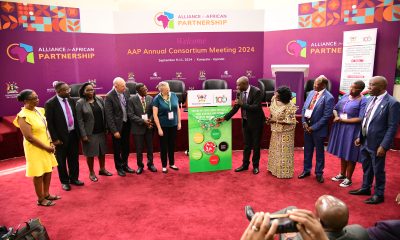

Centre of Excellence in Sickle Cell Anemia Launched as Mak Hosts AAP Meeting
-
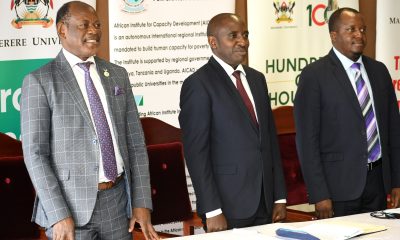

AICAD Selected to Host Africa Open Science Platform Regional Node
-
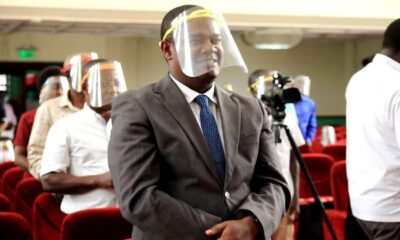

Prof. Noble Banadda Laid to Rest
-
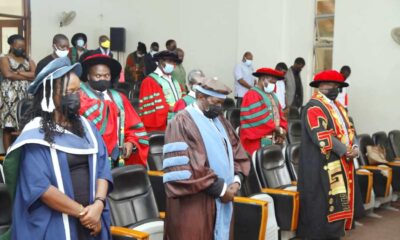

Mak Mourns Prof. Banadda, Unveils Plans for ICU & Oxygen Plant
-
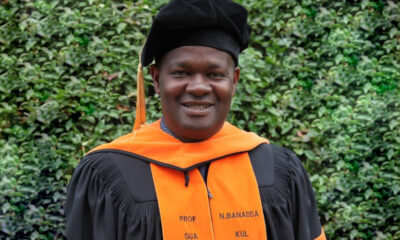

Tribute to Late Prof. Noble Banadda
-
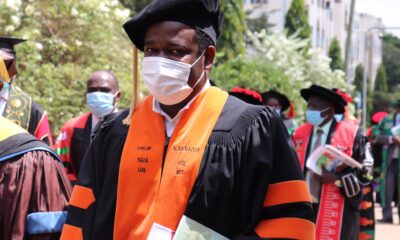

Mourning Prof. Noble Banadda
Agriculture & Environment
NbS4Tea Project Team Makes Great Progress, Deploys Drones for Data Collection
Published
1 week agoon
June 24, 2025
****Funded by the Danish Fellowship Centre under Denmark’s Ministry of Foreign Affairs, NbS4Tea is a five-year initiative aimed at enhancing climate resilience and tea productivity in Uganda.
Launch of drones for data collection
The Nature-based Solutions for Tea (NbS4Tea) project has registered a significant milestone with the successful deployment of drones to improve environmental and agricultural data collection.
On 19th June 2025, the project team officially launched the drones at the Rwebitaba Tea Research Centre in Kyenjojo District, the project’s main research hub. The launch event included hands-on training sessions by Mr. Timothy Mutungi, a certified Remote Sensing Drone Pilot. Mr. Mutungi provided detailed instruction on drone operation, safety procedures, and data acquisition techniques specifically tailored to the project’s goals. The training was attended the core NbS4Tea researchers as well as students supported by the project.

By utilizing drone technology, the team will be able to capture high-resolution imagery and gather critical environmental data across vast tea-growing areas. This will enable more precise assessments of biodiversity, soil health, water use, and overall ecosystem services. The valuable insights generated will guide the development of sustainable, nature-based agricultural practices with the potential for widespread adoption throughout the tea industry.
About the NbS4Tea Project
NbS4Tea is a five-year initiative aimed at enhancing climate resilience and tea productivity in Uganda. Funded by the Danish Fellowship Centre under Denmark’s Ministry of Foreign Affairs and led by Dr Emmanuel Arthur from Aarhus University, the project is being implemented through a consortium of Ugandan and Danish institutions namely: Makerere University, the National Agricultural Research Organization (NARO), Uganda, Uganda Tea Association, Aarhus University, Denmark, and Kick-start International.

The primary objective of the project is to sustainably close the tea yield gap in Uganda by developing research-driven, nature-based solutions that enhance the climate resilience of tea production systems. This involves identifying climate-resilient tea varieties, integrating tea prunings and banana by-products, utilizing nitrogen-fixing agroforestry trees, and improving irrigation management. The approach emphasizes socio-economic feasibility, capacity building in research, and a market-oriented, multi-stakeholder collaboration to ensure both environmental and economic sustainability.
At Makerere University, the project is coordinated by Dr Alex Nimusiima from the Department of Geography, Geo-Informatics and Climatic Sciences at CAES. Other Project members are; Dr Grace Nakabonge from the Department of Forestry, Biodiversity and Tourism; Dr Prossy Nakawuka from the Department of Agricultural and Bio-systems Engineering; Dr Twaha Ali Basamba from the Department of Agricultural Production; and Dr Alice Turinawe from the Department of Agribusiness and Natural Resource Economics.

Specific objectives
- Identify and quantify climate change impacts on tea yield and quality based on historical and newly obtained data and novel data mining methods.
- Screen, select and recommend tea varieties adapted to abiotic (drought and heat) and biotic stresses (diseases and pests).
- Develop new knowledge on the potential of local waste biomass (tea prunings, banana pseudostems and peels) as soil amendments- mulch, compost, biochar, to recycle nutrients, improve soil fertility, increase carbon sequestration and alleviate drought.
- Reveal NbS through agroforestry combined with organic mulch, irrigation and resilient tea varieties that increase biodiversity and tea yield.
- Innovate new methods to enhance tea production under climate change through rainwater harvest and climate-smart irrigation infrastructure.
- Empower vulnerable groups (women, youth, and people with disabilities) in tea production and processing to ensure multi-actor involvement and socio-economic benefit outreach of the proposed NbS in tea cultivation and production.
- Identify export market strategies for NbS tea products, aligned with consumer preferences.

Progress thus far
Launched in January 2024, the project, organized in five work packages, has registered significant progress. Each of the work packages listed below supports one PhD student and one Masters’ student. The PhD students are: i) Mr. Adiga Hassan from the Department of Geography, Geo-Informatics and Climatic Sciences at CAES conducting research under work package 1; ii) Ms. Sarah Namayengo from the Department of Forestry, Biodiversity and Tourism conducting research under work package 2; Ms. Vivian Namutebi from the Department of Soil Science and Land Use Management undertaking research on work package 3; Mr. Keneth Chelimo from the Department of Agricultural and Biosystems Engineering conducting his research under work package 4; and Ms. Moreen Asasira from the Department of Agribusiness and Natural Resource Economics focusing on work package 5. The Masters students are: i) Ms. Evelyn Katasi from the Department of Environmental Management at CAES (work package 1), Mr. Vereriano Turyahebwa from Department of Forestry, Biodiversity and Tourism (work package 2); Mr. Ben Okurut from the Department of Soil Science and Land Use Management (work package 3); Mr. Augustine Okot from the Department of Agricultural and Biosystems Engineering (work package 4); and Mr. Augustine Kigozi from the Department of Agribusiness and Natural Resource Economics (work package 5)

Work packages and achievements registered
Work Package 1: Climate change impacts on tea yield and quality – Headed by Dr. Alex Nimusiima
This work package centres on the analysis of historical and projected climate conditions in the study area. It examines how current climate patterns influence tea production, as well as the potential effects of future climate change on tea yield and quality.
Progress
i) A household survey assessing the socio-economic status of tea farmers and the effects of climate variability on their livelihoods has been completed.
ii) The collected data has been cleaned, and the Masters student supported under this work package is currently writing her thesis based on the survey findings.
iii) A historical climate analysis of the study area has been conducted by the PhD student, who is now preparing a manuscript.

Work Package 2: Screening & selecting tea genotypes for resilience to abiotic and biotic stresses – Headed by Assoc. Prof. Grace Nakabonge
This work package focuses on evaluating existing tea genotypes for their resistance to pests and diseases, using chlorophyll fluorescence imaging as a diagnostic tool.
Progress
i) A screen house has been constructed to serve as the experimental site.
ii) Germplasm from two tea varieties is currently being cultivated in the screen house in preparation for the upcoming experiments.
iii) A drone has been acquired to assist in data collection for this work package.

Work Package 3: Evaluation of NbS for climate resilience, higher yield and biodiversity- Headed by Assoc. Prof. Twaha Ali Basamba
This focuses on the characterization of mulch and biochar derived from tea prunings to improve soil health. It also aims to quantify the added value of Nature-based Solutions (NbS) in enhancing tea productivity, promoting climate resilience, and supporting biodiversity.
Progress
- So far, Biochar has been produced from tea prunings and characterized.
- The Masters student supported under this work package is writing his thesis on the results of biochar characterization.

Work Package 4: Innovating smart and scalable irrigation technology for improved tea production- Headed by Dr. Prossie Nakawuka
This work package aims to develop and evaluate smart, scalable irrigation solutions to boost tea production. It focuses on assessing how irrigation impacts tea yield and quality, measuring water use efficiency, and analyzing the economic returns of irrigation practices. Additionally, it explores deficit irrigation and climate-resilient strategies to ensure sustainable tea farming in changing environmental conditions.
Progress
- The irrigation infrastructure is now in place and fully operational at Rwebitaba Tea Research Centre in Kyenjojo District.
- The experimental plots for irrigation experiments are already in place with water pipes.

Work package 5: Socio-economic assessment of tea-agroforestry and selected tea varieties – Headed by Dr. Alice Turinawe
This work package emphasizes co-creation within multi-stakeholder innovation networks to evaluate the economic feasibility and market access of tea agroforestry systems. It also focuses on promoting gender balance and understanding consumer valuation of Nature-based Solutions (NbS) tea from Uganda.
Progress
To date, two co-creation workshops have been successfully conducted and the Masters student under this work package is currently analyzing the workshop results as part of their research.

Expected outputs and outcomes
- Increased tea production, productivity, and biodiversity through the adoption of NbS.
- Increased research and technical capacity of Makerere and R-ZARDI.
- Holistic stakeholder insight on economic feasibility, consumer acceptance and market access strategies, especially for vulnerable groups in the tea value chain.
- Increased job prospects for youth and women in tea production sub-sectors.
- Improved social status and increased incomes of tea farmers, traders, and exporters.
- Improved economic and environmental quality by recycling biomass waste into value-added products dedicated to soil enhancement.
- 4+ high-yielding tea genotypes adapted to drought and heat, diseases and pests.
- 15+ scientific articles, conference presentations.
- Five PhDs and Five MSc degrees.
- Market access assessment and empowerment.

Details on the project: https://news.mak.ac.ug/2024/01/new-caes-project-to-improve-tea-production-in-uganda/
More photos from the event



General
Directorate of Graduate Training Rolls out Research Management Information Sytems (RIMS)
Published
3 weeks agoon
June 12, 2025By
Mak Editor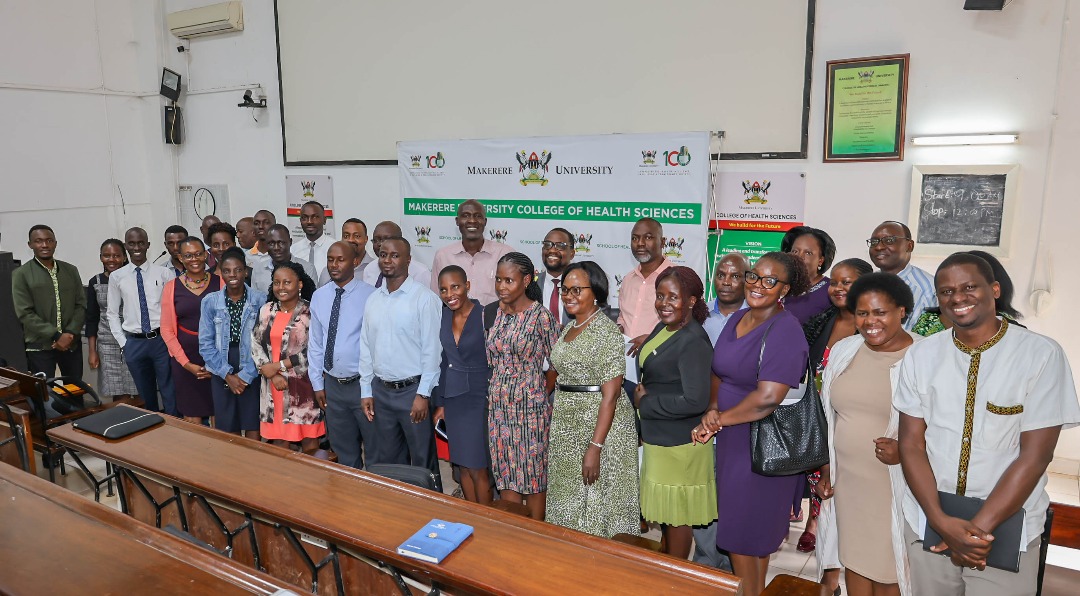
By: Moses Lutaaya
The Directorate of Graduate Training is rolling out the Research Management Information systems (RIMS) to efficiently and effectively monitor the academic progress of all graduate students.
“RIMS will be used to track efficiently every stage of activity of graduate studies from course works, research concept to thesis completion.” The Director of Graduate Training, Prof. Julius Kikooma said.
He added, “The RIMS team is here to share developments on the system that are designed to support the agenda of Makerere university. When graduate students enter a given chapter of their research works, their supervisors will automatically receive mail prompts to swiftly handle, give comments and guide the students on the way forward.”
During the roll out training recently at the College of Health Sciences in Mulago, Prof. Kikooma said, “The Directorate of Graduate Training is working in collaboration with Directorate of Innovation, Research and Partnerships (DIRP) and the Directorate of Information Communication and Technology Support (DICTS) to ensure a smooth training to all the schools and colleges. Digitalising the graduate management process is anticipated to increase the number of graduate admissions and completion in the long run.”
“As the three directorates, we sat and reviewed the university graduate strategy and policies around it. We got reviewed policies and procedures approved by the University Senate last year. We no longer have provisional admission letter requirement for our PhD students. It is now full admission straight away and we follow a cohort system of admission for the PhD by research students.” He added.
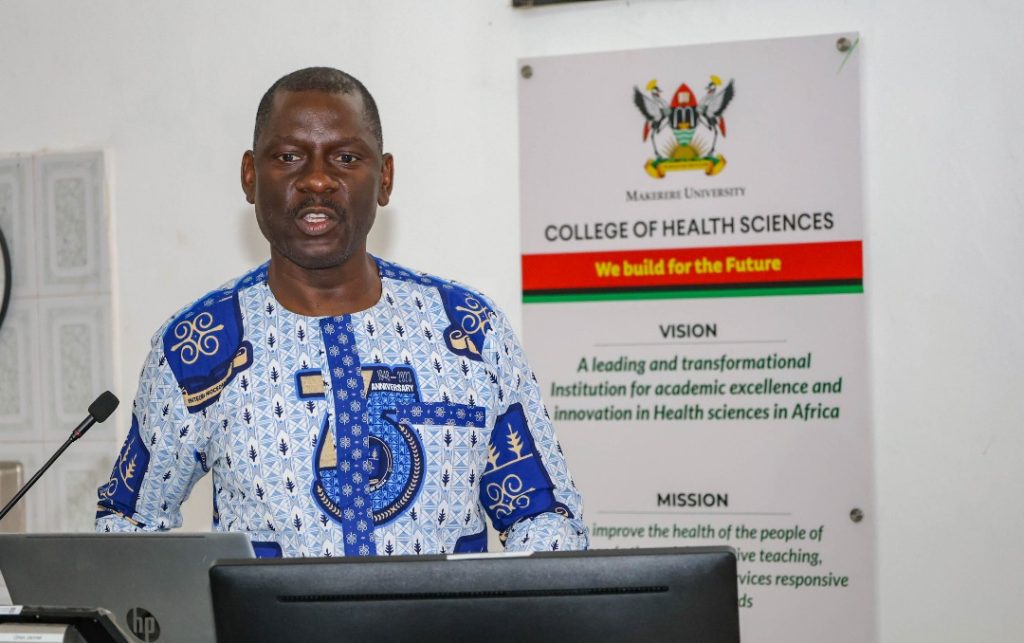
RIMS is a version of how the Directorate of Graduate Training aims to handle the process of systematic tracking of every point of progress in the entire academic journey of graduate students.
The Directorate of Graduate Training has so far conducted the RIMS training at three Colleges namely; College of Health Sciences (CHS), College of Business and Management Sciences (COBAMS) and College of Natural Sciences (CONAS).
The critical stakeholders on the RIMS value chain include Heads of Departments, College Principals and Deputy Principals, Directors, School Deans, Supervisors as well as Graduate coordinators. “All the above are key actors and must be able to use RIMS in the graduate process, capturing all profiles of students and supervisors and should be able to use it appropriately.” He emphasized.
He said that RIMS will bring all stakeholders on the same page and will be able to adequately troubleshoot any hinderance to progress when course works are done, to dissertation and thesis completion. Makerere university target is to increase its graduate students’ enrollment from 19% to at least 30% in the next five years.
Prof. Bruce James Kirenga, Principal College of Health Sciences welcomed RIMS training saying that this kind of E- learning and supervision tracking is the way to handle graduate studies as it seems to reduce the turn around time for student- supervisor responses.
“Every activity in the graduate students learning journey is monitored swiftly. Whatever the students upload on to the system, supervisors get message pop-ups on their mails, review the works immediately and attach comments for the students to appreciate and manage appropriately.” He said.
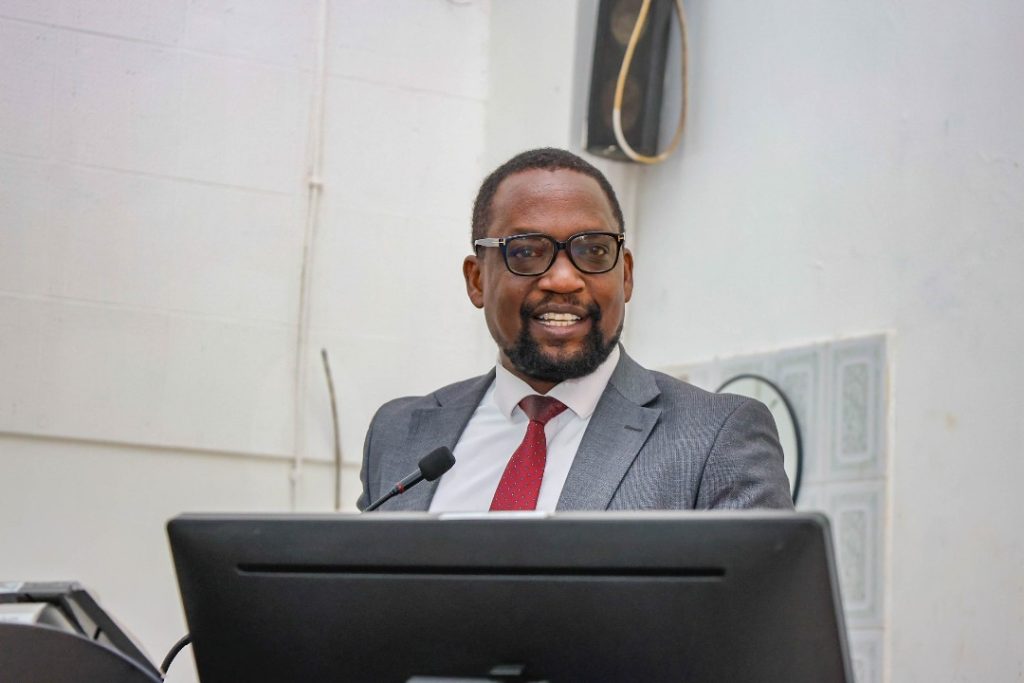
Prof. Kirenga added that the audit trail created under RIMS will provide good progressive academic reports and improve the journey to Doctoral studies.
“Heads of Departments are able to see all students in the department, any pending system approvals, observe completion rates and total progressive over view of each student and that the total overview of department performance will be clearly seen under RIMS.” He added.
Dr. Robert Kalyesubula – the Chair. Dept of Physiology, Makerere University College of Health Sciences said RIMS will improve the efficiency of supervisors while handling the graduate students.
“RIMS views all documents and proposals of students. We will be able to observe which supervisor takes long to respond, the number of days they have taken to respond and how long an issue has pended undone at a certain level.”
Research
Mak and MSU Host Landmark Symposium on Insects for Food, Feed, and Food Security in Africa
Published
3 weeks agoon
June 10, 2025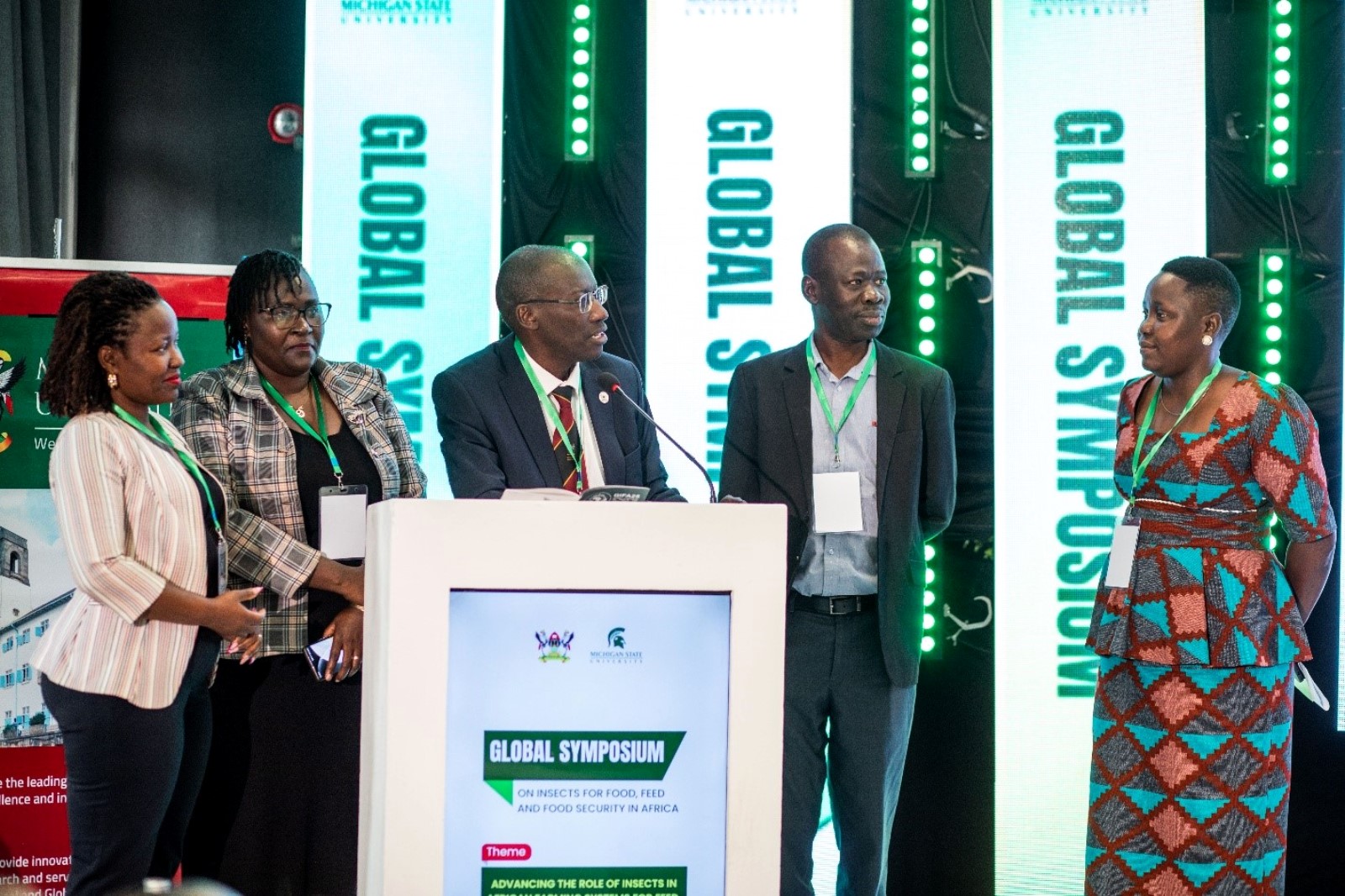
A groundbreaking symposium exploring the role of insects in African farming systems concluded on June 6th, 2025, at Onomo Hotel in Kampala. Convened by Makerere University’s College of Veterinary Medicine, Animal Resources and Biosecurity (CoVAB) in collaboration with Michigan State University (MSU), the event drew participants from over ten countries, including researchers, development experts, regulators, and practitioners.
Under the theme “Advancing the Role of Insects in African Farming Systems for Feed, Food, and Food Security,” the two-day gathering aimed to share knowledge and experiences on integrating insects into food and feed systems to address food security challenges across the continent. The discussions revolved around four key sub-themes namely; Insects as animal feed to promote sustainable livestock production and livelihoods; Insects for human food and food security, including indigenous insect-based diets; Insects for improved soil health and crop production and Commercialization of insect farming, with a focus on regulation and standardization.
The symposium commenced with opening remarks delivered on behalf of Makerere University’s Vice Chancellor, Prof. Barnabas Nawangwe, by his representative, Prof. Frank Norbert Mwiine, Principal of CoVAB. He welcomed participants and commended Dr. Deborah Amulen, Lecturer at CoVAB and chief convener, for organizing a well thought out event. He emphasized that the symposium would not only raise awareness of the role of insects in Uganda’s and Africa’s socio-economic development but also help place insects on the agenda for broader discussions and integration into food security strategies. He said the event served as a platform for knowledge exchange, highlighting the untapped potential of insect farming in transforming food security, sustainable agriculture, and economic growth.
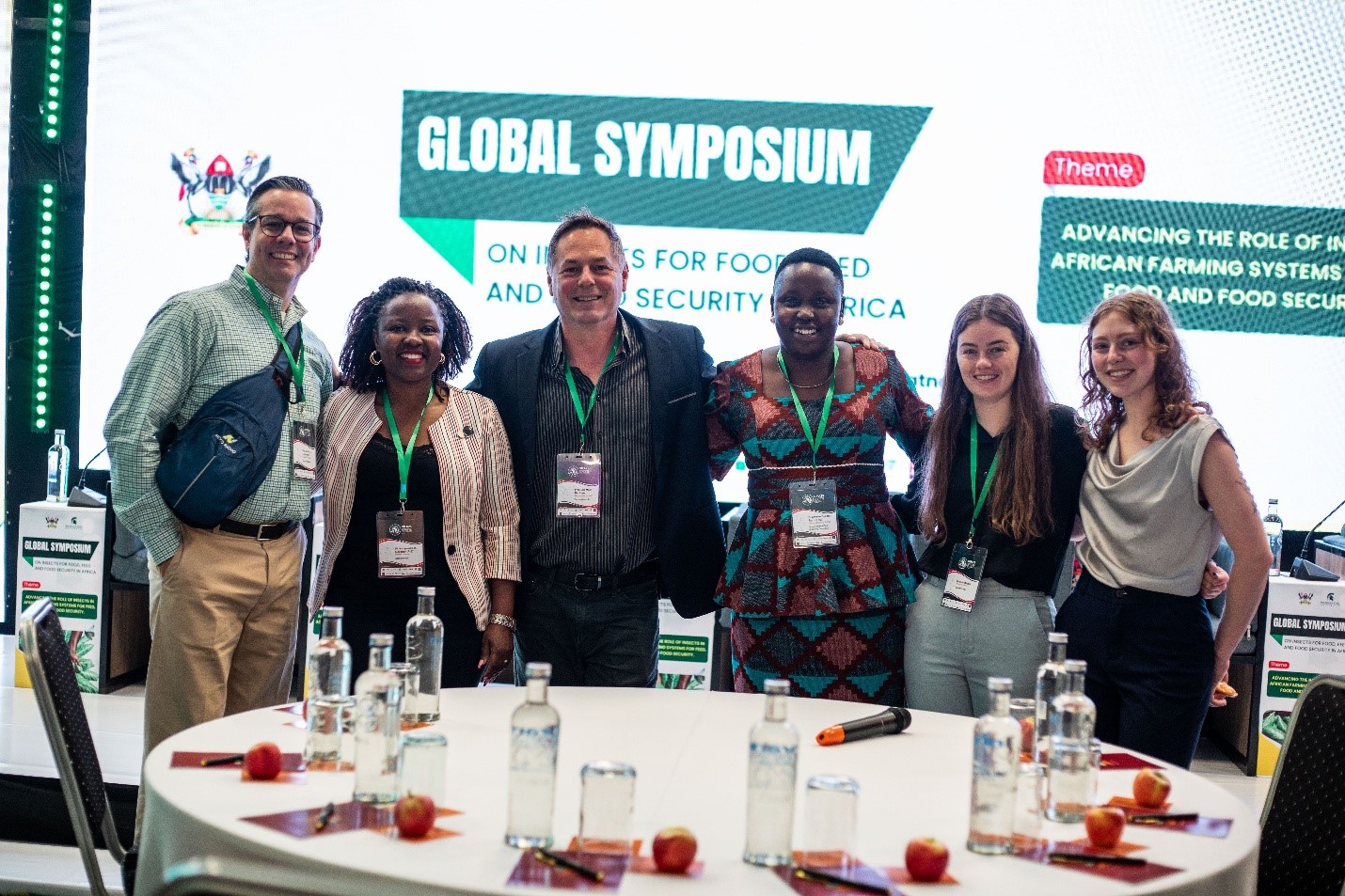
Key facilitators at the symposium were esteemed experts from leading institutions worldwide, who shared their insights on insect-based food systems and sustainable agriculture. Among the distinguished speakers were Prof. Jeffrey K. Tomberlin from Texas A&M University, Prof. Eric M. Benbow from Michigan State University, Prof. Florence Dunkel from Montana State University, Dr. Denise Beesigamukama, a Postdoctoral Fellow, ICIPE Kenya and Dr. Deborah Amulen the host from Makerere University. These are exemplified in their contribution towards academic research and leadership, policy and industry impact and more importantly their expertise in insect science.
During the deliberations, the experts emphasized that insects offer a viable, sustainable, and nutrient-rich solution to Africa’s growing food demands. The event underscored ongoing research and commercialization efforts aimed at mainstreaming insect farming into the agricultural sector. As global interest in alternative protein sources continues to rise, the symposium marked a significant step toward harnessing the potential of insects to enhance food security in Africa.
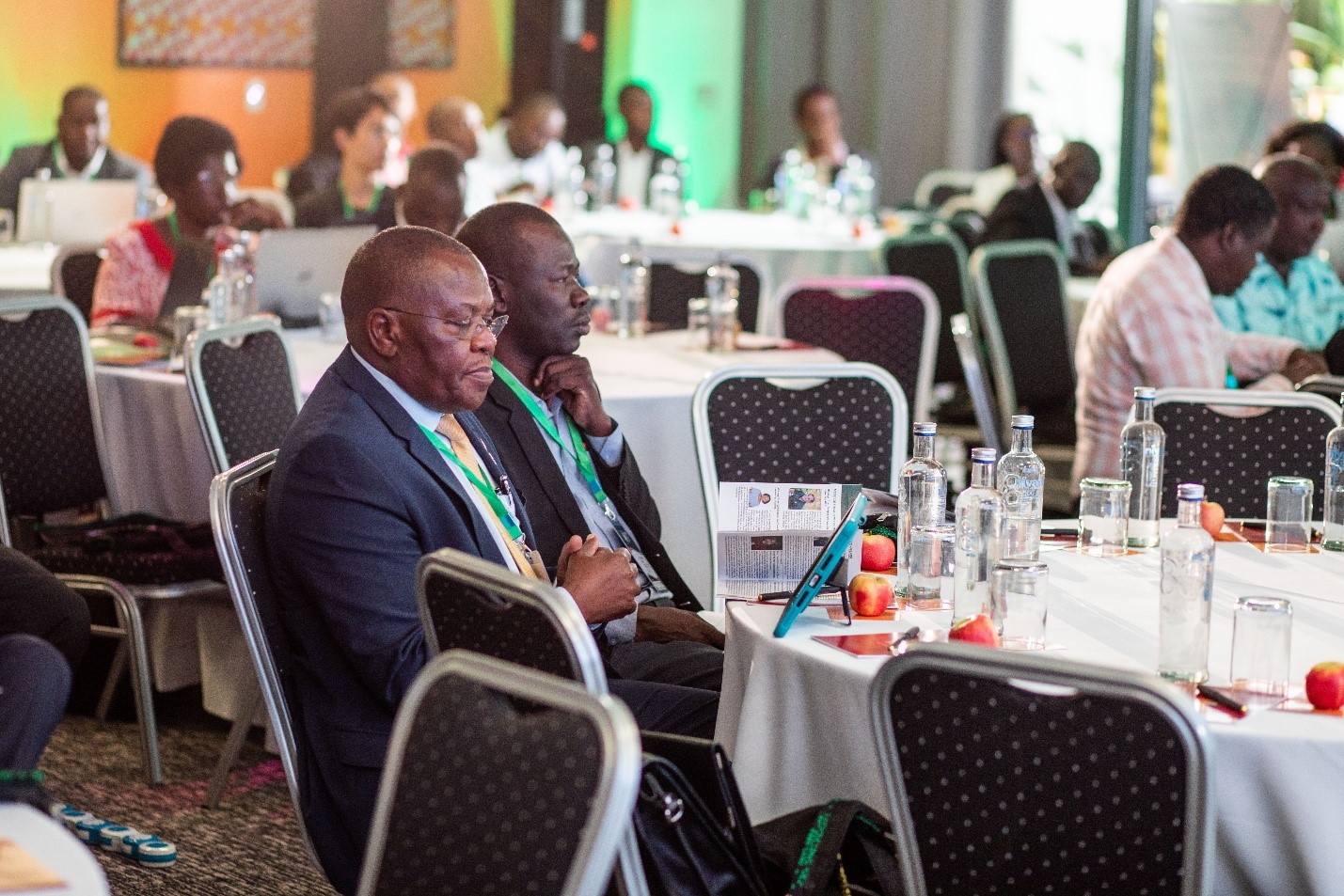
Experts underscored that Africa is home to over 470 recognized edible insect species, providing a rich source of proteins, fats, and essential micronutrients. Insects have historically been a staple in diets across Uganda, Southern Africa, and other regions, serving as a vital food source in times of drought, conflict, and food scarcity. One of the most discussed innovations at the event was the large-scale farming of Black Soldier Fly, which is being utilized to produce not only the larvae but also frass, a high-protein animal feed and organic fertilizer to enhance soil health and boost agricultural yields.
Several scholars presented their research in the area of Insects, where together with the farmers, industry representatives, policy makers and practitioners contributed valuable perspectives on advancing the role of insects in food security, animal feed, and ecological sustainability in Africa. Their discussions underscored the importance of research, policy, and commercialization in expanding insect farming across the continent.
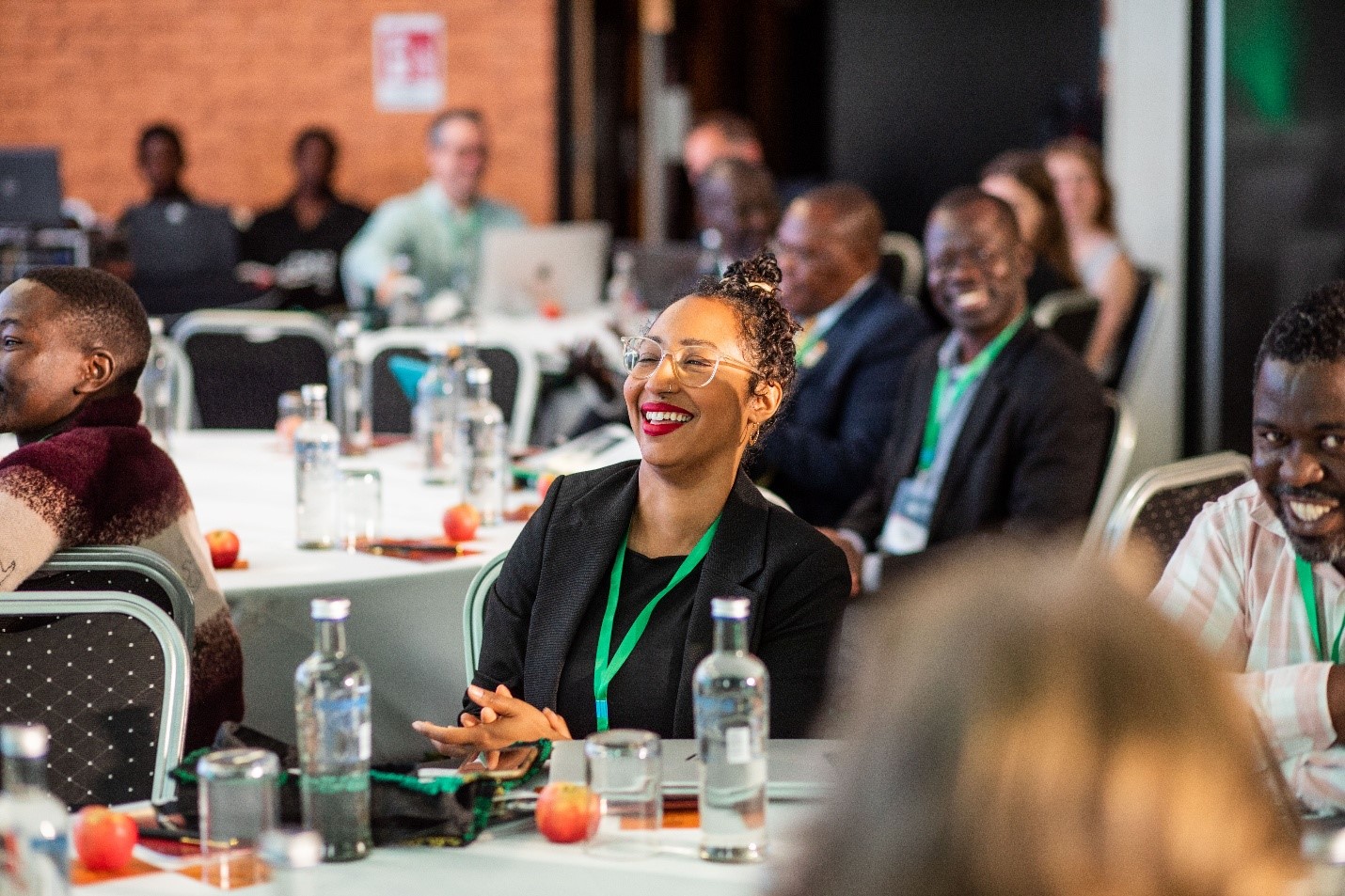
One of the keynote discussions highlighted Uganda’s rich tradition of consuming insects as part of its food culture, reinforcing their significance in nutrition and sustainability. Participants shared insights on local insect consumption practices and their role in livelihoods, drawing from countries like Cameroon, Malawi and many others represented at the event. The forum also featured representatives from key institutions, including the National Council for Science and Technology and The National Agricultural Research Organization (NARO) which contributed perspectives on research, policy development, and commercialization of insects as sustainable food sources, the Ministry for Agriculture, Animal Industry, and Fisheries (MAAIF), emphasizing the Ugandan government’s support for insect farming initiatives.
The Kenya based scientific research institute, the International Centre of Insect Physiology and Ecology (ICIPE) played a key role in the discourse and exhibited several innovations arising from research and their work in insects. Experts explored how insects can revolutionize animal feed production, providing an affordable, high-protein alternative to conventional sources.
With global attention shifting toward alternative and sustainable food sources, experts stressed the need for policy standardization and enhanced investment in insect-based food systems across Africa. During the event, MAAIF announced a $325 million investment through a six-year Smart Agriculture Transformation Project, aimed at expanding sustainable farming practices, reducing environmental impact, and increasing food security through alternative protein sources.
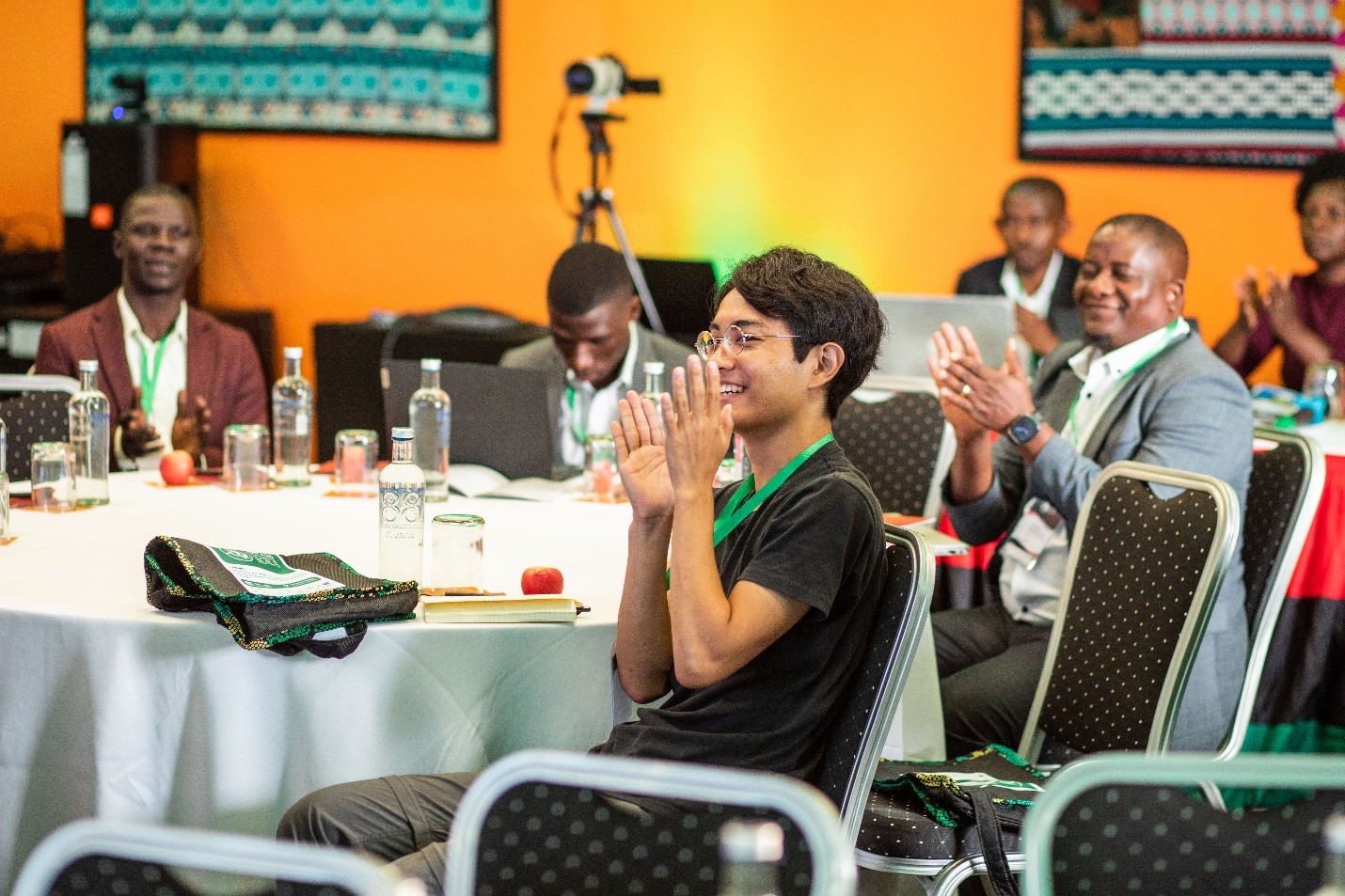
The symposium reaffirmed Africa’s position at the forefront of insect farming research, with discussions centered on scaling production, improving regulation, and leveraging indigenous knowledge for food security solutions. Moving forward, participants emphasized the importance of quality control, standardization, and policy frameworks to ensure safety, scale production, and boost market competitiveness. With Uganda leading discussions on alternative protein sources, the symposium laid the foundation for future innovations in agriculture.
Trending
-

 General5 days ago
General5 days agoMature Age Scheme Exam Results for 2025/2026
-

 General1 week ago
General1 week agoFreshers’ Joining Instructions 2025/2026
-

 General1 week ago
General1 week agoMastercard Foundation Board pays its inaugural visit to Makerere University
-

 General1 week ago
General1 week agoUVCF Makes Case for HEAC Programme
-
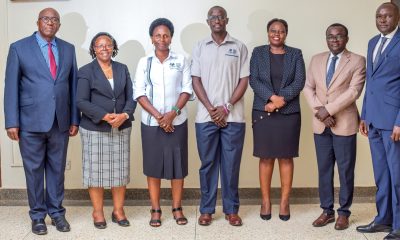
 General2 weeks ago
General2 weeks agoCall For Expression of Interest: MURBS MIS Requirements Gathering
